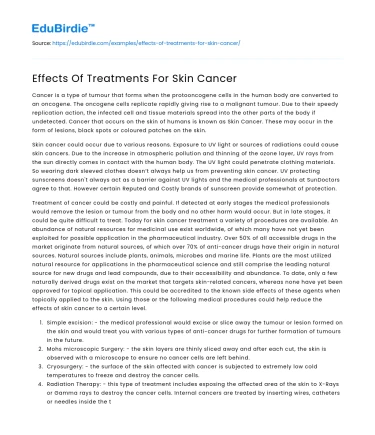Introduction
Skin cancer, one of the most common forms of cancer worldwide, has prompted significant research into effective treatments. The advent of various therapeutic modalities has considerably improved patient prognosis and survival rates. However, these treatments can also have diverse effects on patients’ health and quality of life. Understanding the balance between efficacy and adverse effects is crucial for optimizing patient care. This essay explores the impact of different treatment modalities for skin cancer, examining their effectiveness, associated side effects, and implications for patients. The discussion will highlight surgical interventions, radiation therapy, and immunotherapy, providing insights into their respective roles in skin cancer management. By evaluating both the benefits and the challenges associated with each treatment, this essay aims to offer a comprehensive perspective on the impact of these interventions, enabling informed decision-making for patients and healthcare providers.
Surgical Interventions and Their Impact
Surgical intervention remains a cornerstone in the treatment of skin cancer, particularly for non-melanoma types such as basal cell carcinoma and squamous cell carcinoma. Surgery offers the advantage of immediate removal of cancerous tissue, often resulting in high cure rates. According to a study published in the Journal of the American Academy of Dermatology, Mohs micrographic surgery has a success rate of over 95% for certain skin cancers. This technique involves the precise excision of cancerous cells while sparing as much healthy tissue as possible, minimizing cosmetic impact and preserving function.
Save your time!
We can take care of your essay
- Proper editing and formatting
- Free revision, title page, and bibliography
- Flexible prices and money-back guarantee
Despite its effectiveness, surgery can lead to various complications. Postoperative pain, risk of infection, and scarring are common concerns that may affect patients' quality of life. In some cases, extensive surgeries may be required, leading to significant physical and psychological ramifications. For instance, patients undergoing surgery for melanoma may experience lymph node removal, which can result in lymphedema, a condition characterized by swelling due to lymphatic fluid accumulation. A study by Morton et al. highlights that although surgery is effective, the incidence of lymphedema following lymph node dissection can reach up to 20%.
Such outcomes necessitate a careful assessment of surgical intervention's potential benefits and risks. While surgery provides a definitive solution in many cases, its impact on patients can vary considerably, underscoring the need for personalized treatment plans. Transitioning from surgical treatments, it is essential to explore the role of radiation therapy, which offers an alternative approach for managing skin cancer.
Radiation Therapy: Efficacy and Challenges
Radiation therapy is another widely used treatment modality for skin cancer, particularly when surgery is not feasible. It is often employed for inoperable tumors or in cases where surgical outcomes may be cosmetically unacceptable. Radiation therapy works by damaging the DNA of cancer cells, thereby inhibiting their ability to replicate and grow. According to the International Journal of Radiation Oncology, radiation therapy has demonstrated significant efficacy in treating localized basal and squamous cell carcinomas.
While effective, radiation therapy can also lead to several adverse effects. Acute reactions such as skin erythema, desquamation, and fatigue are commonly reported among patients undergoing treatment. Long-term effects may include skin atrophy, fibrosis, and an increased risk of secondary malignancies. A retrospective study by Nguyen et al. found that approximately 15% of patients experience late skin changes, which can have lasting implications on their physical appearance and psychological well-being.
Moreover, radiation therapy requires multiple sessions over several weeks, which can be burdensome for patients, particularly the elderly or those with limited mobility. Despite these challenges, radiation therapy remains a vital component of skin cancer treatment, especially for patients who cannot undergo surgery. As we consider the shift from radiation therapy, the emergence of immunotherapy presents a promising frontier in skin cancer management.
Immunotherapy: A New Horizon in Treatment
Immunotherapy has revolutionized the treatment landscape for various cancers, including melanoma, the most aggressive form of skin cancer. This treatment modality harnesses the body's immune system to target and destroy cancer cells. Immune checkpoint inhibitors, such as pembrolizumab and nivolumab, have shown remarkable efficacy in improving survival rates for patients with advanced melanoma. A pivotal study published in The New England Journal of Medicine reported a two-year survival rate of 64% among patients treated with pembrolizumab.
However, the benefits of immunotherapy come with the possibility of significant side effects. Immune-related adverse events can affect any organ system, with the skin, liver, and gastrointestinal tract being the most commonly involved. Dermatological side effects, such as rash and pruritus, occur in up to 40% of patients. More severe complications, including hepatitis and colitis, necessitate prompt recognition and management to prevent serious outcomes.
Furthermore, not all patients respond to immunotherapy, and the high cost of treatment poses accessibility challenges. Despite these hurdles, immunotherapy represents a paradigm shift in skin cancer treatment, offering hope for patients with previously limited options. As we conclude this exploration of skin cancer treatments, it is essential to synthesize these insights to inform future directions in clinical practice.
Conclusion
The treatment of skin cancer involves a multifaceted approach, with each modality offering distinct advantages and challenges. Surgical interventions, while effective, may lead to physical and psychological effects that necessitate careful consideration. Radiation therapy provides a viable alternative for patients unable to undergo surgery, yet it also presents a unique set of side effects. Meanwhile, the advent of immunotherapy heralds a new era in skin cancer treatment, offering promising outcomes for patients with advanced disease.
Ultimately, the choice of treatment should be individualized, taking into account the specific characteristics of the cancer, the patient's overall health, and their personal preferences. As research continues to advance, the development of more targeted and less toxic therapies holds the promise of improving outcomes for skin cancer patients. By understanding the nuanced effects of current treatments, healthcare providers can better guide patients in making informed decisions, ultimately enhancing their quality of life and long-term prognosis.






 Stuck on your essay?
Stuck on your essay?

